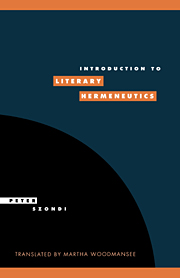Book contents
- Frontmatter
- Contents
- Foreword by Joel Weinsheimer
- Translator's preface
- Chapter 1 Introduction
- Chapter 2 Chladenius, I
- Chapter 3 Chladenius, II
- Chapter 4 Chladenius, III
- Chapter 5 Chladenius, IV
- Chapter 6 Meier, I
- Chapter 7 Meier, II
- Chapter 8 Ast
- Chapter 9 Schleiermacher, I
- Chapter 10 Schleiermacher, II
- Afterword by Jean Bollack
- Index
Afterword by Jean Bollack
Published online by Cambridge University Press: 14 December 2009
- Frontmatter
- Contents
- Foreword by Joel Weinsheimer
- Translator's preface
- Chapter 1 Introduction
- Chapter 2 Chladenius, I
- Chapter 3 Chladenius, II
- Chapter 4 Chladenius, III
- Chapter 5 Chladenius, IV
- Chapter 6 Meier, I
- Chapter 7 Meier, II
- Chapter 8 Ast
- Chapter 9 Schleiermacher, I
- Chapter 10 Schleiermacher, II
- Afterword by Jean Bollack
- Index
Summary
A future in the past: Peter Szondi's material hermeneutics
Peter Szondi's historical redefinition of the science of literature turns against the influence which the analysis of the Heideggerian structure of Dasein exerted in Germany within university circles, both during and after the Second World War. More specifically, Szondi's opposition is aimed at the model established by Heidegger's commentaries on the poems of Hölderlin. The true stakes of the battle fought by Szondi for the development of a critical philology consist in the refusal of a theologically defined position and the principles it implies, which may be regarded as dominant, even in other countries than Germany, where one observes, in certain circles, a fascination with the possibility of surpassing academic and learned criticism.
Although the model furnished by the new approach to reading was borrowed from the philosophy of existence, it corresponded largely to the stylistic and methodical habits of traditional exegesis. It was Hans Georg Gadamer who was to include and legitimize them in his hermeneutic theory. Philology as a discipline appeared to him as insufficiently representative of – and thus excluded from – the realm of positive science, as well as from the “regeneration” of knowledge. His aim was to separate the theory of historical understanding from the so-called historico-critical method of the philological specialists.
- Type
- Chapter
- Information
- Introduction to Literary Hermeneutics , pp. 135 - 140Publisher: Cambridge University PressPrint publication year: 1995

